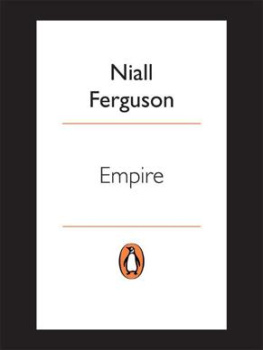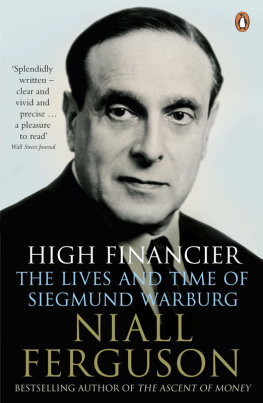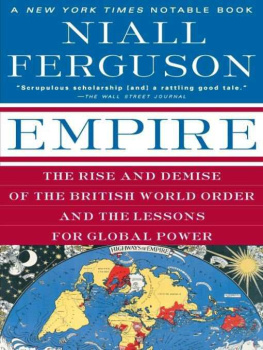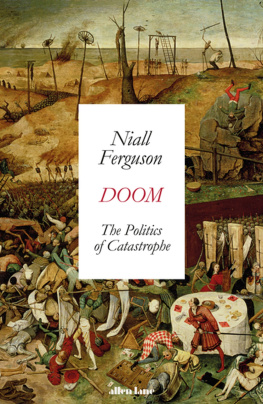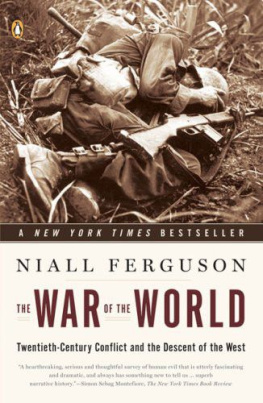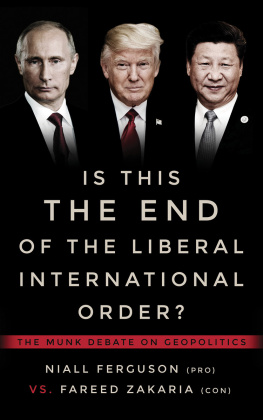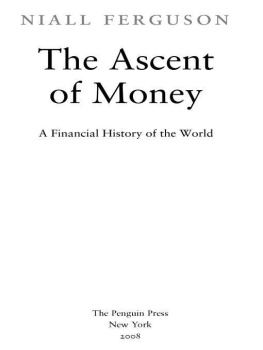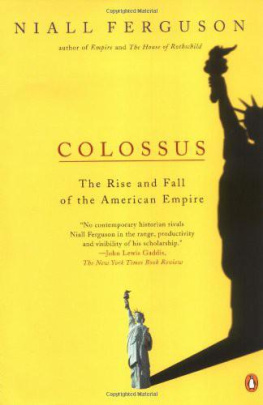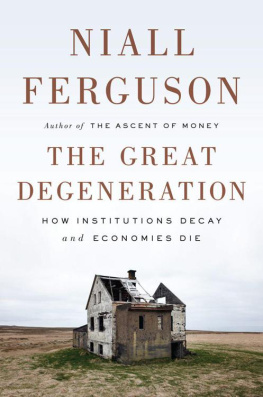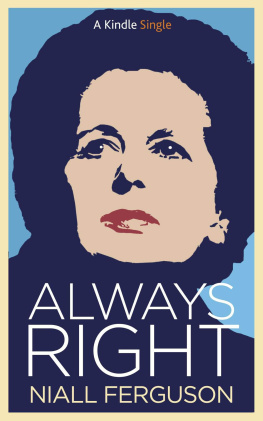Niall Ferguson - Empire: How Britain Made the Modern World
Here you can read online Niall Ferguson - Empire: How Britain Made the Modern World full text of the book (entire story) in english for free. Download pdf and epub, get meaning, cover and reviews about this ebook. year: 0, publisher: Penguin Group, genre: History. Description of the work, (preface) as well as reviews are available. Best literature library LitArk.com created for fans of good reading and offers a wide selection of genres:
Romance novel
Science fiction
Adventure
Detective
Science
History
Home and family
Prose
Art
Politics
Computer
Non-fiction
Religion
Business
Children
Humor
Choose a favorite category and find really read worthwhile books. Enjoy immersion in the world of imagination, feel the emotions of the characters or learn something new for yourself, make an fascinating discovery.
- Book:Empire: How Britain Made the Modern World
- Author:
- Publisher:Penguin Group
- Genre:
- Year:0
- Rating:4 / 5
- Favourites:Add to favourites
- Your mark:
- 80
- 1
- 2
- 3
- 4
- 5
Empire: How Britain Made the Modern World: summary, description and annotation
We offer to read an annotation, description, summary or preface (depends on what the author of the book "Empire: How Britain Made the Modern World" wrote himself). If you haven't found the necessary information about the book — write in the comments, we will try to find it.
Empire: How Britain Made the Modern World — read online for free the complete book (whole text) full work
Below is the text of the book, divided by pages. System saving the place of the last page read, allows you to conveniently read the book "Empire: How Britain Made the Modern World" online for free, without having to search again every time where you left off. Put a bookmark, and you can go to the page where you finished reading at any time.
Font size:
Interval:
Bookmark:

How Britain Made the Modern World

PENGUIN BOOKS
Niall Ferguson is Professor of International History at Harvard University, Senior Research Fellow of Jesus College, Oxford University and a Senior Fellow of the Hoover Institution, Stanford University. He is the author of Paper and Iron, The House of Rothschild (two volumes), The Pity of War, The Cash Nexus, Empire and Colossus. He was also the editor of Virtual History. He lives in Oxfordshire with his wife and three children.
PENGUIN BOOKS
A wonderfully readable book, a dazzling conflation of political, military, social and economic history, enlivened with fascinating characters and anecdotes Brian Urquhart, New York Review of Books
Although his book is an impressive synthesis, it is also a perceptive and original work because he makes the subject protean, to be looked at and pondered on from unusual angles. And he does so in prose that is always readable Marvellous David Gilmour, Financial Times
Excellent Ferguson has done a first-rate job on a subject that is looming ever larger on the historical horizon. Empires are striking back
Piers Brendon, Independent
Popular history at its best
Daniel Davidson, Washington Post
Though Empire is scrupulous scholarship, it is also a rattling good tale
John OSullivan, Wall Street Journal
Clever, audacious and pacily written
Linda Colley, Guardian
An elegant and thoughtful survey of a great historic achievement
Max Hastings, Sunday Telegraph
Popular history as it should be written: elegant, witty and approachable. It is also polemical, clever, unconventional and provocative
Richard Aldous, Irish Times
For Ken and Vivienne
The old river in its broad reach rested unruffled at the decline of day, after ages of good service done to the race that peopled its banks, spread out in the tranquil dignity of a waterway leading to the uttermost ends of the earth The tidal current runs to and fro in its unceasing service, crowded with memories of men and ships it had borne to the rest of home or to the battles of the sea. It had known and served all the men of whom the nation is proud It had borne all the ships whose names are like jewels flashing in the night of time It had known the ships and the men. They had sailed from Deptford, from Greenwich, from Erith the adventurers and the settlers; kings ships and the ships of men on Change; captains, admirals, the dark interlopers of the Eastern trade, and the commissioned generals of East India fleets. Hunters for gold or pursuers of fame, they all had gone out on that stream, bearing the sword, and often the torch, messengers of the might within the land, bearers of a spark from the sacred fire. What greatness had not floated on the ebb of that river into the mystery of an unknown earth! The dreams of men, the seed of commonwealths, the germs of empires
Joseph Conrad, Heart of Darkness
Britain controls today the destinies of some 350,000,000 alien people, unable as yet to govern themselves, and easy victims to rapine and injustice, unless a strong arm guards them. She is giving them a rule that has its faults, no doubt, but such, I would make bold to affirm, as no conquering state ever before gave to a dependent people.
Professor George M. Wrong, 1909
Colonialism has led to racism, racial discrimination, xenophobia and related intolerance, and Africans and people of African descent, and people of Asian descent and indigenous peoples were victims of colonialism and continue to be victims of its consequences
Durban Declaration of the World Conference against Racism, Racial Discrimination, Xenophobia and Related Intolerance, 2001
Once there was an Empire that governed roughly a quarter of the worlds population, covered about the same proportion of the earths land surface and dominated nearly all its oceans. The British Empire was the biggest Empire ever, bar none. How an archipelago of rainy islands off the north-west coast of Europe came to rule the world is one of the fundamental questions not just of British but of world history. It is one of the questions this book seeks to answer. The second and perhaps more difficult question it addresses is simply whether the Empire was a good or bad thing.
It is nowadays quite conventional to think that, on balance, it was bad. Probably the main reason for the Empires fall into disrepute was its involvement in the Atlantic slave trade and slavery itself. This is no longer a question for historical judgement alone; it has become a political, and potentially a legal, issue. In August 1999 the African World Reparations and Repatriation Truth Commission, meeting in Accra, issued a demand for reparations from all those nations of Western Europe and the Americas and institutions, who participated and benefited from the slave trade and colonialism. The sum suggested as adequate compensation based on estimates of the number of human lives lost to Africa during the slave-trade, as well as an assessment of the worth of the gold, diamonds and other minerals taken from the continent during colonial rule was $777 trillion. Given that more than three million of the ten million or so Africans who crossed the Atlantic as slaves before 1850 were shipped in British vessels, the putative British reparations burden could be in the region of 150 trillion.
Such a claim may seem fantastic. But the idea was given some encouragement at the United Nations World Conference against Racism, Racial Discrimination, Xenophobia and Related Intolerance, held in Durban in the summer of 2001. The conferences final report acknowledged that slavery and the slave trade were a crime against humanity of which people of African descent, Asians and people of Asian and indigenous peoples were victims. In another of the conferences declarations, colonialism was casually lumped together with slavery, the slave trade apartheid and genocide in a blanket call to UN member states to honour the memory of the victims of past tragedies. Noting that some States have taken the initiative to apologize and have paid reparation, where appropriate, for grave and massive violations committed, the conference called on all those who have not yet contributed to restoring the dignity of the victims to find appropriate ways to do so.
These calls have not gone unheeded in Britain itself. In May 2002 the director of the London-based think tank Demos, which may be regarded as the avant-garde of New Labour, suggested that the Queen should embark on a world tour to apologize for the past sins of Empire as a first step to making the Commonwealth more effective and relevant. The news agency that reported this remarkable suggestion added the helpful gloss: Critics of the British Empire, which at its peak in 1918 covered a quarter of the worlds population and area, say its huge wealth was built on oppression and exploitation.
At the time of writing, one BBC website (apparently aimed at school-children) offered the following equally incisive overview of imperial history:
The Empire came to greatness by killing lots of people less sharply armed than themselves and stealing their countries, although their methods later changed: killing lots of people with machine guns came to prominence as the armys tactic of choice [It] fell to pieces because of various people like Mahatma Gandhi, heroic revolutionary protester, sensitive to the needs of his people.
Font size:
Interval:
Bookmark:
Similar books «Empire: How Britain Made the Modern World»
Look at similar books to Empire: How Britain Made the Modern World. We have selected literature similar in name and meaning in the hope of providing readers with more options to find new, interesting, not yet read works.
Discussion, reviews of the book Empire: How Britain Made the Modern World and just readers' own opinions. Leave your comments, write what you think about the work, its meaning or the main characters. Specify what exactly you liked and what you didn't like, and why you think so.

